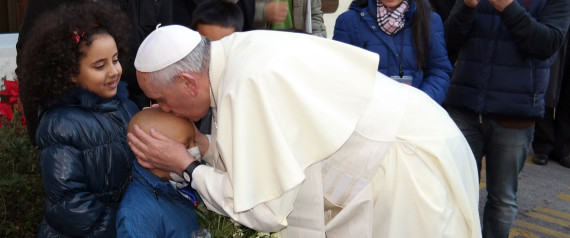
Since his election last March, Pope Francis has intrigued many progressive Catholics, hoping that a decades-long winter is at last coming to an end, and he has worried some conservative Catholics, anxious of change, that come to a Church they believe is an unchanging rock of stability in a world of flux. Among those yearning for continuity, one hears frequently the assertion that Francis is not changing any doctrines, no matter what other changes he may make or promote.
I would like to suggest that attention to Evangelii Gaudium, The Joy of the Gospel, an Apostolic Exhortation recently published by Pope Francis, reveals a pope who is contributing to and encouraging doctrinal development -- a somewhat more nuanced term than change -- in Christology and Ecclesiology. If Ecclesiology deals with what the Church is supposed to be, Christology deals with who Jesus Christ is, and why he matters. The Jesus that Francis speaks of in this exhortation is a suffering Jesus, present in and among the poor: "We are called to recognize the suffering Christ," in the homeless, the addicted, refugees, indigenous peoples, the elderly and migrants. One who would preach the gospel effectively must, like Jesus, identify with the vulnerable of the earth, stand with them, and be a voice for their liberation. Francis sees a preferential option for the poor as indispensable for anyone who seeks to know Jesus.
This pope is a Jesuit, and Jesuits speak of themselves as companions of Jesus, and friends in the Lord; Pope Francis says that disciples experience Jesus as walking with them and working with them, as they savor his "friendship" with them. And also echoing, or paralleling, the idiom of evangelical Protestant theology, Pope Francis states that this friendship is one of "personal encounter" with Jesus, the Jesus who tenderly carries us on his shoulders. While Pope Francis acknowledges the limitations of our efforts to understand who Jesus is, he states that: "Jesus can also break through the dull categories, with which we would enclose him and he constantly amazes us by his divine creativity." Thus Francis implies that Jesus himself may cause us to re-examine what we thought were settled questions.
In his Apostolic Exhortation, Francis draws on papal teaching from Pope Paul VI to Benedict XVI, and also very heavily on the documents of Vatican II, and on documents produced more recently by conferences of bishops in various parts of the world, especially in Latin America. By highlighting and including Vatican II and episcopal conferences, Francis moves away from an emphasis on papal magisterium alone. In balancing papal supremacy with episcopal collegiality, Francis encourages an Ecclesiology that is less vertical and more horizontal. Indeed he says quite explicitly that he wishes to promote a "decentralization" of the teaching office in the Church. The Church, as Francis imagines it, does not have all the answers, for it is a disciple that "needs to grow in her interpretation of the revealed word and in her understanding of truth." The entire Church, for Francis, is a learning Church. Thus, the humility that has been observed in the lifestyle Pope Francis has adopted is something that he would seem to want to extend to the Church as teacher. Francis acknowledges that some Catholics, "those who long for a monolithic body of doctrine guarded by all and leaving no room for nuance," may find this undesirable, but he responds by affirming that "We need to listen to and complement one another in our partial reception of reality and the Gospel." Again citing Vatican II, Francis envisions the Church as on a pilgrimage, and thus as in need of transformation rather than as resting on some laurels.
Pope Francis insists on inclusion of diverse persons: "The Church is not a tollhouse; it is the house of the Father, where there is a place for everyone, with all their problems." And the Eucharist "is not a prize for the perfect, but a powerful medicine and nourishment for the weak." Here Pope Francis reflects a long tradition of Jesuit advocacy of frequent reception of the Eucharist and of few barriers to such reception. But just how far might such a trajectory go? Who, if anyone, should be excluded from receiving communion? This is ultimately not only a matter of practice, but a doctrinal matter, for it touches on what Catholics believe about the Church and the sacrament of the Eucharist.
Much of this Apostolic Exhortation is directed at preachers and evangelizers, and Pope Francis does not hesitate to exhort them to touch "the suffering flesh of Christ in others," and to take on the "smell" of the sheep. Francis offers foundations for fresh ways of thinking about priesthood. The priest who exhibits "an ostentatious preoccupation for the liturgy" and who would turn the Church into a museum, he calls to go forth into the streets where the people are, and to get his hands dirty. This, going forth, is not just about practices or styles of ministry, but about the theology of the sacrament of orders and about what the Church believes ordained ministry to be. Deploring "clericalism," Pope Francis cautions against emphasizing priestly power, rather than service of the people. In stressing the priest as preacher, Francis insists that he must be a hearer of the Word and a witness to Christ before he can hope to be an effective preacher.
Pope Benedict XVI beatified John Henry Cardinal Newman (1801-90), the most eloquent of advocates for acknowledgement and acceptance of doctrinal development in the Catholic Church. Such development appears to be part of what Pope Francis has encouraged in his first year as bishop of Rome. Much of what Pope Francis says in his recent Apostolic Exhortation builds on what earlier popes and bishops have said; it may also contribute to doctrinal development, especially by helping to further clarify who Jesus Christ is, and what the Church is, or at least what it is called to be.